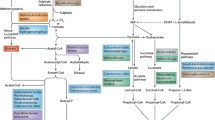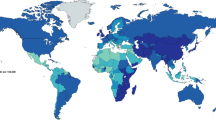Abstract
Because vanadate ion is a potent mitogen and accumulates in the gut of rodents fed vanadate supplements, effects of ammonium metavanadate in drinking water (10 ppm or 20 ppm) were studied on the development of large bowel neoplasms in mice treated with 1,2-dimethylhydrazine (DMH) (20 mg kg-1 weekly for 20 weeks). In the colon at 30 weeks DMH treatment caused a 14% increase in RNA content, an 18% increase in DNA content, and 33% deeper crypts. Vanadate at either 10 ppm or 20 ppm decreased RNA content by approximately 11%. Although vanadate increased thymidine incorporation 210% to 550% compared with controls, it had no influence on the attack rate, incidence, or histological type of tumours induced by DMH.
Similar content being viewed by others
Rights and permissions
About this article
Cite this article
Kingsnorth, A., LaMuraglia, G., Ross, J. et al. Vanadate supplements and 1,2-dimethylhydrazine induced colon cancer in mice: Increased thymidine incorporation without enhanced carcinogenesis. Br J Cancer 53, 683–686 (1986). https://doi.org/10.1038/bjc.1986.112
Issue Date:
DOI: https://doi.org/10.1038/bjc.1986.112
- Springer Nature Limited
This article is cited by
-
Unique and selective mitogenic effects of vanadate on SV40-transformed cells
Molecular and Cellular Biochemistry (1995)
-
Vanadium compounds promote the induction of morphological transformation of hamster embryo cells with no effect on gap junctional cell communication
Cell Biology and Toxicology (1990)




